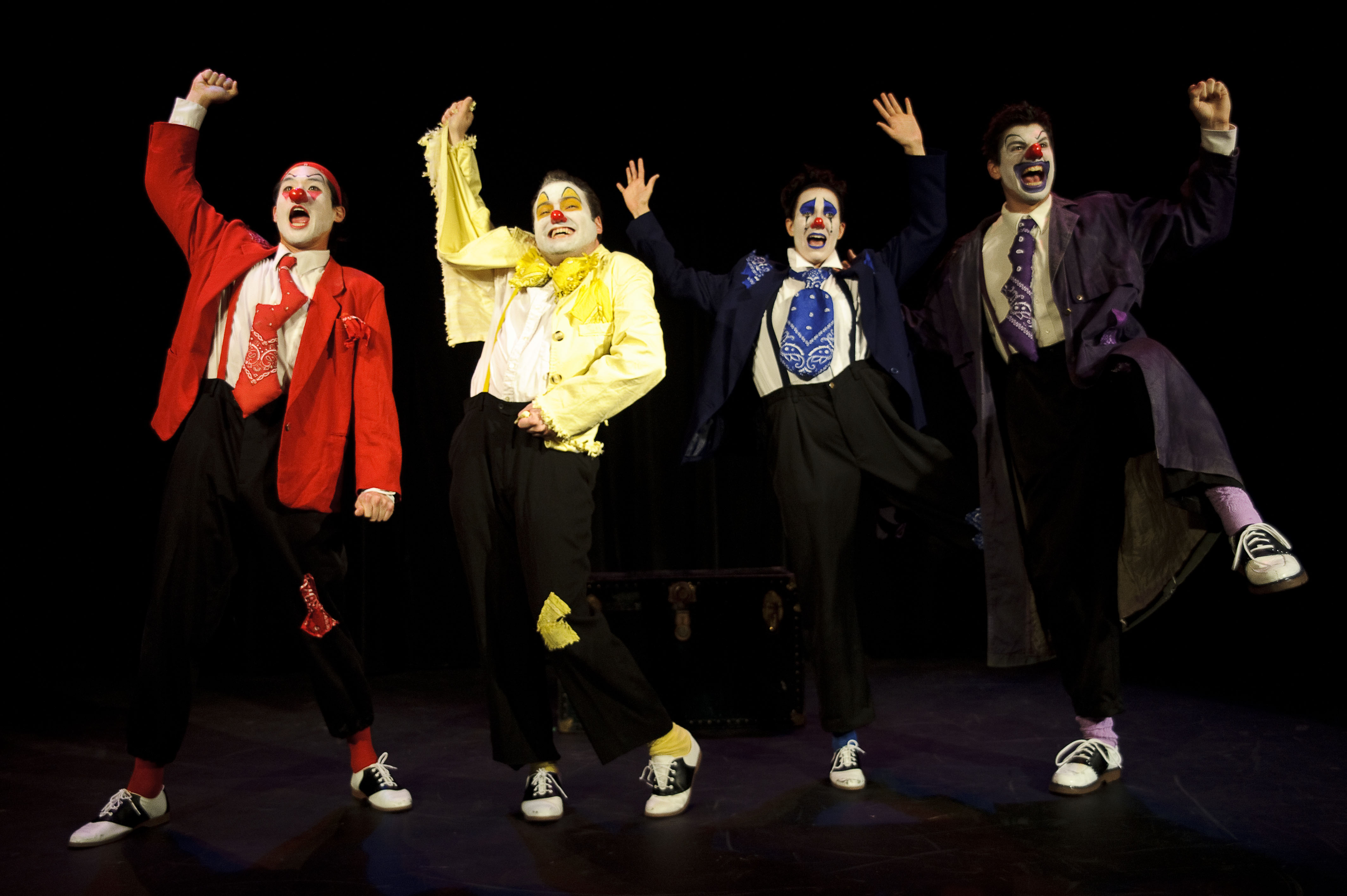Four Clowns
Sacred Fools Theater
May 13-June 10, Fridays at 11 p.m.
![]()
![]()
![]()
![]()
Clowns: More lighthearted than a unicorn, more frightening than the Chupacabra, they have the uncanny ability to both delight audiences and make them want to hide under their beds. While many label all clowns as uniformly and unquestionably creepy (this is perhaps the reason why no one took up my offer of a free guest ticket), the more discerning individual sees beyond the red nose and white face paint. At their essence, clowns navigate the tempestuous seas of human emotion, from ecstasy to depression, from deceit to belief.
“Four Clowns,” a performance piece conceived and directed by Jeremy Aluma, perfectly understands this basic characteristic of the clown. During the roughly 90-minute production, staged at the Sacred Fools Theater in Los Angeles, the audience follows four archetypal clowns representing anger, anxiety, sadness and mischief on their journey from childhood to death.
Structurally, “Four Clowns” is very easy to unpack. A musical number in which each cast member takes a solo introduces each phase of life. Four short dramatic vignettes follow, each scene focusing on a particular clown. Improvisation, audience involvement and physical gags break up the story line’s action, especially when clowns are preparing for their next scene. The predictable structure facilitates audience understanding of the narrative and fortunately does little to detract from the spontaneous and highly unpredictable contents of the show.
The musical numbers, perhaps, are the only exception to this rule. The cast sings well, and the lyrics are thematically meaningful as well as hilariously ribald. However, the songs’ verse-chorus structure lags in comedic pace when compared to the roller coaster of action and emotion in the acted scenes and improvised sketches.
As far as subject matter goes, “Four Clowns” is actually pretty depressing. Physically abusive brothers, sexually abusive teachers and psychologically abusive parents traumatize the clowns in childhood. Awkwardness and bullying mar their adolescence. Depression and disappointment close off their adult lives as they resign themselves to the last musical number’s chorus of “You’re born and then you die.”
Thankfully, the show never becomes a pity party. On the contrary, the loud, raunchy and violent tenets of clowning rarely allow the circumstances to take themselves seriously. A mother giving her daughter nothing but diet pills to eat is monstrous. A soldier who slaughters his own compatriots is shameful. Drug addiction and murder are deplorable. And yet the most resonant measure of social acceptability ““ laughter ““ indicates that the audience embraces the way that “Four Clowns” depicts these tragedies.
To their credit, Alexis Jones, Kevin Klein, Raymond Lee and Amir Levi are superb in their respective roles as Sad, Mischievous, Angry and Nervous clowns. No one actor plays the diva: They share the stage equally and command the audience’s attention. The on-stage pianist, Mario Granville, complements the quartet in their antics with great attention as almost all of his music is improvised to match the clowns’ unpredictable movements.
While the show is funny and fulfilling, any theatergoers need to understand that, despite the music and its fine dramatics, “Four Clowns” is still a clown show. It is loud, violent and vulgar. Pantomimes of fellatio, sodomy and hand jobs are almost too numerous to count. Profanity litters the actors’ lexicon. At times, the brassy content overwhelms the audience’s connection to the story. For the most part, however, it alleviates tension and makes the clowns’ plights more digestible.
Aluma truly has a winner in his hands with “Four Clowns.” The actors’ intense actions help them portray a wide breadth of emotions. And while the mostly harmless show might not appeal to all, there certainly is no need for Angelenos to hide under their beds.
